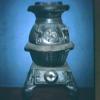H93.34.1
(71.12 cm HIGH x 43.18 cm WIDE x 40.64 cm DEEP)
From the San Francisco Chronicle, 3/14/2004, pg. J1, J4Weldon Russell remembers fondly the infernal smoke, heat, and darkness of the foundries where he spent his youth. Now 77, Russell is the generation owner of Phoenix Iron Works, the Oakland metal works business that his grandfather started 103 years ago. "We've come along way", he said. But, while foundries are cleaner, safer places to work today, he longs for the bustle and profits that were also part of those primitive, soot-filled days. Now Russell struggles to keep his low-tech business from vanishing.Russell's grandfather, William Lewis Russell, put up $1,000 in 1901 to help start Phoenix, a small outfit that made diesel engine parts and cast iron bases for the skyscrapers sprouting up across the bay in San Francisco....William Russell died in 1906, and the company passed to his 18-year-old son, Samuel David Russell. Samuel expanded the businesses and played an integral role in fostering cooperation among various Bay Area foundries. When he dired in 1966, Weldon took control of the company.Weldon built Phoenix into a powerful metal works business that by the late 1960s had a staff of 125. He expanded the product range to include heavy castings such as pile drivers and sugar cane rollers, as well as smaller products such as manhole covers, grates and pipe fittings for cities streets from California to Saudi Arabia. In its heyday, Phoenix poured more than120,000 pounds of liquid metal a day uin its vast plant, which took up four city blocks.But since the 1970s, Phoenix has been in a long slide...Russell says the good days ended more than 20 years ago, when India, China and Brazil started sending cheaper castings to the United States....On top of general market decline, a pair of eminent domain actions by Caltrans also hurt. The waterfront neighborhoods where Phoenix once thrived are now filled up with stylish new condominiums, and the company has been pushed south by two successive evictions into a small rented factory space amid a bilghted section of Oakland's port. The heavy equipment, foundry, and scores of employees are gone, and Russell now acts as a broker, using his knowledge to connect potential buyers to producers that still pour castings. Although it no longer makes castings, Phoenx still blacksmiths lighter specialty jobs including ornate gates for homes in the Oakland hills and the inticately laced halos around the doors of the Palace Hotel in San Francisco....The article continues regarding Russell and the competition of foreign foundaries, particularly for manholes covers, and the cost of upgrading a foundry business to modern standards. After several evictions (the Cypress Freeway replacement runs through Phoenix Ironworks), he settled in a "small site at the Fifth Avenue Marina." In 2004, Phoenix has about $1 million in sales annually.
Used: Jack London | Oakland | Heinhold's First and Last Chance Saloon | Heating





